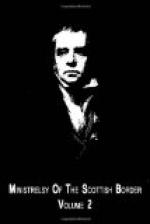And Dalgatie, both stout and keen.—P. 41. v. 1.
Sir Francis Hay, of Dalgatie, a steady cavalier, and a gentleman of great gallantry and accomplishment. He was a faithful follower of Montrose, and was taken prisoner with him at his last fatal battle. He was condemned to death, with his illustrious general. Being a Roman catholic, he refused the assistance of the presbyterian clergy, and was not permitted, even on the scaffold, to receive ghostly comfort, in the only form in which his religion taught him to consider it as effectual. He kissed the axe, avowed his fidelity to his sovereign, and died like a soldier.—Montrose’s Memoirs, p. 322.
And Newton Gordon, burd-alone.—P. 41. v. 1.
Newton, for obvious reasons, was a common appellation of an estate, or barony, where a new edifice had been erected. Hence, for distinction’s sake, it was anciently compounded with the name of the proprietor; as, Newtown-Edmonstone, Newtown-Don, Newtown-Gordon, &c. Of Gordon of Newtown, I only observe, that he was, like all his clan, a steady loyalist, and a follower of Montrose.
And gallant Veitch, upon the field.—P. 41. v. 1.
I presume this gentleman to have been David Veitch, brother to Veitch of Dawick, who, with many other of the Peebles-shire gentry, was taken at Philiphaugh. The following curious accident took place, some years afterwards, in consequence of his loyal zeal.
“In the year 1653, when the loyal party did arise in arms against the English, in the North and West Highlands, some noblemen and loyal gentlemen, with others, were forward to repair to them, with such forces as they could make; which the English, with marvelouse diligence, night and day, did bestir themselves to impede; making their troops of horse and dragoons to pursue the loyal party in all places, that they might not come to such a considerable number as was designed. It happened, one night, that one Captain Masoun, commander of a troop of dragoons, that came from Carlisle, in England, marching through the town of Sanquhar, in the night, was encountered by one captain Palmer, commanding a troop of horse, that came from Ayr, marching eastward; and, meeting at the tollhouse, or tolbooth, one David Veitch, brother to the laird of Dawick, in Tweeddale, and one of the loyal party, being prisoner in irons by the English, did arise, and came to the window at their meeting, and cryed out, that they should fight valiantly for King Charles, Where-through, they, taking each other for the loyal party, did begin a brisk fight, which continued for a while, til the dragoons, having spent their shot, and finding the horsemen to be too strong for them, did give ground; but yet retired, in some order, towards the castle of Sanquhar, being hotly pursued by the troop, through the whole town, above a quarter of a mile, till they came to the castle; where both parties did, to their mutual grief, become sensible of their mistake. In this skirmish there were several killed on both sides, and Captain Palmer himself dangerously wounded, with many mo wounded in each troop, who did peaceably dwell together afterward for a time, untill their wounds were cured, in Sanquhar castle.”—Account of Presbytery of Penpont, in Macfarlane’s MSS.




